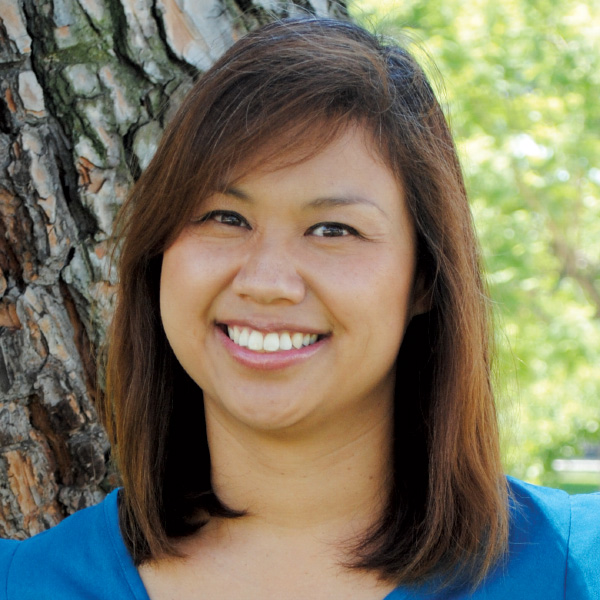 Linda Lam, Director of the Center for Asian Pacific American Students (CAPAS)
Linda Lam, Director of the Center for Asian Pacific American Students (CAPAS)Meet Linda Lam (she/her), the director of the Center for Asian Pacific American Students (CAPAS) at Pitzer, and our first community member spotlight for Asian Pacific Islander Desi American Heritage Month!
How did you get to where you are now? What challenges and victories have you experienced along the way?
I went to UCLA as an undergrad, and what was transformative was taking Asian American Studies courses and connecting my own experiences with the larger US society and globally. I wanted to work alongside people to create positive social change, so I worked in many community nonprofits in LA. I primarily worked with low-income Latinx, Asian, and people of color communities. There was a community engagement coordinator position in the Intercollegiate Department of Asian American Studies, where I connected faculty, staff, and students to community organizations. Then this job as the director for the Center for Asian Pacific American Students (CAPAS) opened. This allowed me to fully work on supporting Asian American and Pacific Islander students and work with faculty to build those connections to Asian American Studies and to communities.
One challenge that I still come across is the model minority myth that Asian Americans are doing well, so they don’t need resources or support. It’s dangerous because, in this broad Asian American Pacific Islander community, there are so many ethnicities and people from different countries with their own struggles and victories in the US. It hides all the things that are going on.
As for victories, having involved alumni is amazing. Even just the existence of a center and having professional staff to directly address and advocate for Asian Pacific Islander Desi American students is important. Being able to celebrate our 20 years at Pitzer is important. Some of the victories are being able to see the growth and development of students in their identity and their political identity.
How do your culture, family background, and history influence your work?
I grew up in a low-income community in northeast LA, where there is a lot of violence and social problems, but at the same time, there were assets and strengths in that community that were ignored. In the media, they would focus on the negative aspects of our neighborhood, but what I saw was the hardworking people like my family. My parents are ethnic Chinese, but they were born in Vietnam, so they fled to escape the war. Their education was cut short, and they dealt with the trauma of war and having US involvement in the country. I try to bring their experiences into my work. When I talk with students, I want to understand, and I want them to bring their family history and community experiences into Pitzer. I want them to always be in tune with that and have it shape their education.
At the same time, I work to broaden the knowledge we have on campus. Students will say that Asian American households have high attainment for bachelor’s degrees and have high income. But I know there are low-income Asian communities because I come from one. If you disaggregate the data, different ethnicities have different rates of educational attainment and income. To be able to bring that into the conversation in our classrooms is important too. It’s important that people understand the diverse experiences that are among Asian Pacific Islander Desi Americans to better address systemic problems and understand there are strengths in their communities and cultural background.
I want students to be proud of their cultural heritage and deepen their understanding of it. We have students that identify as adoptees, multiracial, fifth generation in the US, or recent immigrants. It’s important that students talk about their experience and not be judged for how they grew up while also understanding that not everyone in the community is the same. How do we bring everyone to the light because we’re such a large group? Most times, people think only of East Asians. How do we make sure our programming and classes talk about different populations in our communities? It’s about using our political power to advocate while respecting the autonomy of these different groups.
What does APIDA Heritage Month mean to you?
It means the opportunity to focus and bring attention to the Asian Pacific Islander Desi American communities, issues, struggles, and opportunities for growth. One way we can continue to advocate is for it to be incorporated into more than just one month. It’s also a time of celebration and acknowledgment of where we’ve come from and our home countries alongside what we’ve done here.
Who do you look up to in the APIDA community?
Philip Vera Cruz. He was a Filipino farmworker who started the Agricultural Workers Organizing Committee, which joined with the National Farmworkers Association to form the United Farm Workers. He is influential to me because he talks about how “the movement must go beyond its leaders.” I think about that a lot. Building community and building others to continue the movements for social justice and power.
Another person is Haunani-Kay Trask, who was a Native Hawaiian author/activist. It reminds me there are Indigenous communities within Asian Pacific Islander communities. It reminds me to continue to support Pacific Islander studies.